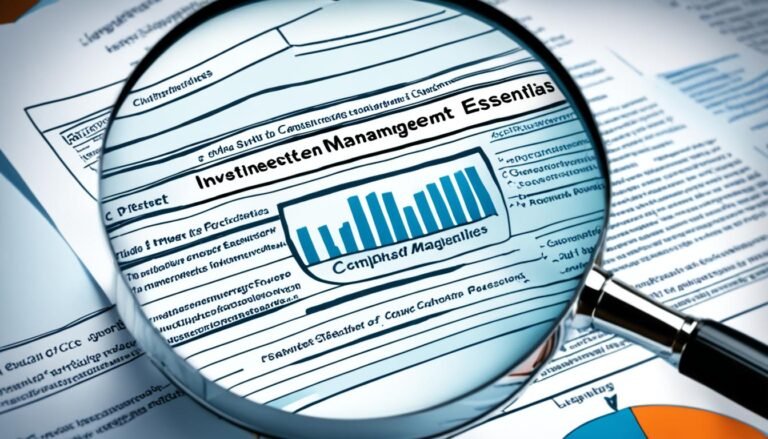Unlocking Secrets: Beneficial Ownership Disclosure
Did you know that from 2024, businesses will be required to disclose details about any owner with a minimum of 25% ownership or significant control? This surprising shift in the business landscape aims to enhance transparency and compliance by revealing the true beneficiaries behind corporate entities.
Beneficial ownership disclosure, also known as Business Ownership Information (BOI) reporting, is a crucial development that every business owner needs to be aware of. The information disclosed goes directly to FINCEN, the Financial Crimes Enforcement Network, facilitating efforts to combat money laundering, terrorist financing, and other financial crimes.
Key Takeaways:
- Starting in 2024, businesses must disclose information about owners with at least 25% ownership or significant control.
- The disclosure aims to enhance transparency in business ownership and facilitate compliance with regulations.
- Businesses formed before January 1, 2024, have until January 1, 2025, to comply.
- Compliance within 30 days of inception is required for businesses formed after January 1, 2024.
- By adhering to punctual and precise reporting, businesses can avoid potential repercussions and contribute to a more transparent financial system.
The Change: New Beneficial Ownership Reporting Requirements
Starting in 2024, businesses with an official record with the Secretary of State must comply with the new beneficial ownership reporting requirements. These requirements mandate the disclosure of information about owners who possess at least 25% ownership or significant control over the business. The primary goal of these reporting requirements is to promote greater transparency in business ownership and ensure compliance with regulations.
For businesses established before January 1, 2024, the deadline for compliance is January 1, 2025. On the other hand, businesses formed after January 1, 2024, are required to comply with the reporting obligations within 30 days of their inception.
Key Details of the New Beneficial Ownership Reporting Requirements:
- Disclosure of information about owners with 25% ownership or significant control
- Deadline: January 1, 2025, for existing businesses; 30 days from inception for new businesses
Complying with these reporting requirements is essential to avoid penalties and ensure business integrity. By accurately disclosing the ownership and control details, businesses demonstrate their commitment to transparency and compliance with regulatory obligations.
| Compliance Timeline | Business Formation Date | Compliance Deadline |
|---|---|---|
| Existing Businesses | Before January 1, 2024 | January 1, 2025 |
| After January 1, 2024 | Within 30 days of inception |
Deciphering the ‘Why’ of Beneficial Ownership Reporting
When businesses hear about the involvement of FINCEN in beneficial ownership reporting, it’s not uncommon for concerns to arise. FINCEN is often associated with financial irregularities, prompting businesses to question the purpose of this reporting requirement. However, it is essential to understand the underlying reasons behind beneficial ownership reporting.
The primary aim of beneficial ownership reporting is to bridge the gap in financial data and enhance the Internal Revenue Service’s ability to validate financial information. By providing comprehensive details about business owners with at least 25% ownership or significant control, this reporting requirement supports the IRS in its efforts to ensure accurate taxation and combat financial crimes.
Adhering to punctual and precise reporting is crucial for businesses as it helps them avoid potential repercussions such as penalties and legal consequences. By embracing beneficial ownership reporting, businesses showcase their commitment to transparency, compliance, and accountability.
Here’s how beneficial ownership reporting benefits businesses:
- Enhanced Financial Integrity: Beneficial ownership reporting helps maintain the integrity of financial data by providing a clear picture of the individuals behind a business entity. This ensures that the IRS can validate financial records effectively.
- Effective Tax Enforcement: By accurately reporting beneficial ownership information, businesses contribute to the IRS’s ability to enforce tax regulations. This reduces the chances of underreported income and assists in the fair distribution of tax burdens.
- Prevention of Financial Crimes: The disclosure of beneficial ownership details acts as a deterrent to individuals seeking to exploit businesses for illicit activities such as money laundering and fraud. This information assists law enforcement agencies in detecting and investigating financial crimes.
- Business Reputation and Trust: Transparency in beneficial ownership establishes trust among stakeholders, including customers, investors, and business partners. By complying with reporting requirements, businesses demonstrate their commitment to ethical practices and strengthen their reputation.
Quote:
“Beneficial ownership reporting is not just about compliance; it is about safeguarding the integrity of the financial system and ensuring a level playing field for businesses.”
Businesses should view beneficial ownership reporting as an opportunity to contribute to a transparent and accountable business environment. It is crucial to stay informed about reporting requirements, seek guidance from trusted sources, and proactively handle compliance obligations. By doing so, businesses can navigate the complexities of beneficial ownership reporting and maintain regulatory compliance with confidence.
Image:
| Benefits of Beneficial Ownership Reporting | Summary |
|---|---|
| Enhanced Financial Integrity | Ensures the accuracy and validity of financial data |
| Effective Tax Enforcement | Supports fair tax enforcement and distribution of tax burdens |
| Prevention of Financial Crimes | Deters and detects illicit financial activities |
| Business Reputation and Trust | Builds trust among stakeholders and strengthens reputation |
Understanding the Greater Context of Beneficial Ownership Reporting
While FINCEN is the direct recipient of beneficial ownership data, it is anticipated that the IRS will also have access to this information. The purpose is to support the IRS’s efforts in confirming financial data for entities that currently merge their data with others. This requirement may lead to heightened audits, particularly for entities with underreported or hard-to-trace income.
filing Data Destination
| Recipients | Purpose |
|---|---|
| FINCEN | To enhance transparency and combat financial crimes. |
| IRS | To validate financial data and support audits. |
Understanding the destination of beneficial ownership data is crucial to grasp the wider implications of reporting requirements. While financial disclosures are primarily shared with FINCEN, the involvement of the IRS extends beyond the initial recipient. This broader access serves to reinforce the accuracy of financial data and increase scrutiny on entities that may have previously underreported or obscured their income.
Heightened audits may be a concern for entities with complex ownership structures or income sources that are challenging to trace. By facilitating greater transparency and data accessibility, beneficial ownership reporting empowers regulatory bodies to effectively identify and tackle potential tax evasion or illicit financial activities.
Turning to Trusted Sources for Guidance on Beneficial Ownership Reporting
When it comes to navigating the complexities of beneficial ownership reporting, businesses can rely on trusted sources for accurate guidance and compliance assistance. One such invaluable resource is the digital portal provided by FINCEN, the Financial Crimes Enforcement Network.
FINCEN’s online platform offers a wealth of information and resources specifically tailored to beneficial ownership reporting. This official source ensures that businesses can access reliable and up-to-date details regarding their reporting obligations and requirements. By consulting FINCEN’s digital portal, businesses can stay informed and make informed decisions regarding their compliance efforts.
However, for personalized insights and comprehensive guidance, businesses may also consider seeking assistance from seasoned tax planning professionals. These experts have the expertise and experience to navigate the intricacies of beneficial ownership reporting and provide tailored solutions to meet the specific needs of each business. By partnering with these professionals, businesses can ensure accurate reporting and stay compliant with the regulations.
Expert Assistance for Beneficial Ownership Reporting
Trusted tax planning professionals offer invaluable compliance assistance by:
- Providing a thorough understanding of the reporting requirements and obligations
- Assisting with the identification and verification of beneficial owners
- Ensuring proper documentation and record-keeping
- Offering advice on effective strategies to streamline the reporting process
- Helping businesses stay updated with any regulatory changes or updates
With their in-depth knowledge and experience, tax planning professionals can provide businesses with the guidance and support needed to navigate the complexities of beneficial ownership reporting and ensure full compliance.
When it comes to beneficial ownership reporting, businesses can’t afford to take any chances. Seeking guidance from trusted sources and experienced professionals ensures accuracy and compliance, safeguarding businesses from potential penalties and reputational damage.
| Benefits of Turning to Trusted Sources for Guidance |
|---|
| Promotes accurate reporting and compliance |
| Ensures access to up-to-date information and resources |
| Provides personalized insights and tailored solutions |
| Offers professional expertise in navigating complex reporting requirements |
The Road Ahead for Beneficial Ownership Reporting
As businesses navigate the new reporting requirement for beneficial ownership, they may encounter challenges along the way. However, with the right approach and preparation, these challenges can be overcome. It is crucial for businesses to understand the changes and take proactive steps to ensure compliance.
Staying informed about the latest updates and regulations surrounding beneficial ownership reporting is essential for successfully navigating this new landscape. By remaining up to date, businesses can anticipate potential challenges and address them promptly.
Understanding the Challenges
One of the primary challenges businesses may face is gathering accurate and comprehensive information about their beneficial owners. Identifying individuals with at least 25% ownership or significant control requires thorough research and due diligence.
Another challenge is ensuring the security and confidentiality of the data being reported. With sensitive information at stake, it is crucial for businesses to implement robust data protection measures and comply with privacy regulations.
Furthermore, the implementation of beneficial ownership reporting may require businesses to invest in new systems or technologies to streamline the reporting process. This financial investment can pose challenges, particularly for small and medium-sized enterprises.
A Proactive Approach to Compliance
To overcome these challenges, businesses should take a proactive approach to compliance with beneficial ownership reporting. This includes:
- Conducting thorough due diligence to identify and gather accurate information about beneficial owners.
- Implementing strong data protection measures and ensuring compliance with privacy regulations.
- Seeking guidance from legal and tax professionals who specialize in beneficial ownership reporting.
- Regularly reviewing and updating internal policies and procedures to align with evolving regulations.
- Staying informed about changes and updates related to beneficial ownership reporting through reputable sources.
“Being proactive in addressing the challenges of beneficial ownership reporting is crucial for businesses to ensure compliance and maintain trust with regulators and stakeholders.”
By taking a proactive approach, businesses can minimize the impact of challenges and ensure a smooth transition into the new reporting requirements.
The Corporate Transparency Act and Beneficial Ownership Reporting
The Corporate Transparency Act, enacted in 2021, introduces a significant requirement for small businesses to report information on their “beneficial owners.” This new legislation aims to foster corporate transparency and enhance compliance with regulatory standards. Effective from January 1, 2024, many small businesses, including those in the financial industry like RIA firms, are subject to beneficial ownership reporting obligations.
While certain exemptions exist for specific types of businesses, it is essential for small businesses to understand their compliance requirements under the Corporate Transparency Act. Reporting accurate and timely information about beneficial owners is crucial to ensure compliance and maintain transparency in business operations.
Financial advisory firms, such as RIA firms, fall within the purview of the Corporate Transparency Act and must adhere to the beneficial ownership reporting obligations. By disclosing relevant ownership information, these firms play a vital role in expanding the transparency landscape and offering greater accountability to regulatory authorities.
| Small Business Reporting Obligations under the Corporate Transparency Act | Exemptions |
|---|---|
| Small businesses, including RIA firms, must report information on their beneficial owners with a minimum ownership interest of 25%. | Certain types of businesses, such as publicly traded companies, registered investment companies, credit unions, and entities already subject to substantial reporting requirements, may be exempt. |
| Financial advisory firms play a vital role in ensuring compliance and providing accurate ownership information for reporting purposes. | Compliance exemptions may vary based on business size, nature, and specific circumstances. Consultation with legal or compliance professionals is recommended. |
Ensuring Compliance with Beneficial Ownership Reporting
To meet the compliance requirements of the Corporate Transparency Act, small businesses, including financial advisory firms, should take a proactive approach. Here are some essential steps to ensure compliance:
- Understand the reporting obligations specific to your business and industry.
- Identify and gather information on beneficial owners who meet the minimum ownership threshold.
- Ensure accuracy and completeness of the reported information, including full legal names, ownership percentages, and contact details.
- Establish internal processes and systems to facilitate ongoing compliance with reporting requirements.
- Stay updated with regulatory guidance and any changes to compliance obligations.
- Seek professional guidance from legal or compliance experts to navigate the complexities of beneficial ownership reporting.
By adopting a proactive and diligent approach, small businesses, including financial advisory firms, can fulfill their compliance obligations under the Corporate Transparency Act. This not only promotes corporate transparency but also helps build trust and confidence with regulatory authorities and stakeholders.
Applicability of Beneficial Ownership Reporting to Financial Advisory Firms
Financial advisory firms, especially state-registered Registered Investment Advisors (RIAs), are required to adhere to beneficial ownership reporting obligations. This entails disclosing information about their beneficial owners, as mandated by regulatory authorities. However, it’s important to note that Securities and Exchange Commission (SEC)-registered RIAs are generally exempt from this reporting requirement. On the other hand, state-registered RIAs must comply unless they meet specific criteria for exemption, such as being dually registered as insurance producers or broker-dealers.
Defining Beneficial Owners for BOI Reporting Purposes
When it comes to BOI reporting, it is crucial for financial advisory firms to accurately identify and report their beneficial owners. But who exactly are these beneficial owners?
Beneficial owners for BOI reporting purposes are individuals who directly or indirectly exercise substantial control over the reporting company or own or control at least 25% of its ownership interests.
This definition encompasses both direct and indirect beneficial owners, ensuring comprehensive disclosure of individuals who have a significant stake in the company.
Accurately identifying and reporting beneficial owners is vital for financial advisory firms to comply with BOI reporting requirements and uphold their commitment to transparency and accountability.
Pictured above: An image illustrating the concept of beneficial owners. Understanding who these individuals are is essential for BOI reporting.
| Key Points | Benefits |
|---|---|
| Identification of individuals with substantial control | – Enhanced transparency |
| Disclosure of individuals with at least 25% ownership interests | – Compliance with reporting requirements |
| Consideration of both direct and indirect beneficial owners | – Comprehensive understanding of ownership structure |
| Accurate reporting of individuals with significant stake | – Upholding regulatory standards |
By accurately defining and reporting beneficial owners, financial advisory firms demonstrate their commitment to compliance and integrity in the realm of BOI reporting.
Reporting Requirements for BOI
When it comes to BOI reporting, financial advisory firms have specific requirements for disclosing information about their beneficial owners. These requirements aim to ensure transparency and accountability in the financial industry. Accurate reporting is crucial to comply with regulatory authorities and maintain the integrity of the reporting process.
Required Information for BOI Reporting
Financial advisory firms need to provide the following information about their beneficial owners:
- Full legal name
- Date of birth
- Residential or business address
- Unique identifying number (e.g., driver’s license)
By providing this necessary information, firms contribute to information disclosure and enable regulatory authorities to monitor the ownership structure of financial institutions effectively.
| Information | Description |
|---|---|
| Full Legal Name | The complete legal name of the beneficial owner. |
| Date of Birth | The birthdate of the beneficial owner. |
| Residential or Business Address | The address at which the beneficial owner resides or conducts business. |
| Unique Identifying Number | A unique identification number, such as a driver’s license, that can be used to verify the identity of the beneficial owner. |
Ensuring accuracy and completeness when reporting this information is essential to meet reporting requirements and maintain compliance with BOI regulations.
Reporting accurate and comprehensive information about beneficial owners is vital to meet the BOI reporting requirements. By fulfilling these obligations, financial advisory firms contribute to greater transparency and accountability in the financial industry.
Conclusion
In conclusion, beneficial ownership disclosure is a crucial regulatory requirement that promotes transparency and compliance in business. Financial advisory firms, including state-registered RIAs, have the responsibility to comply with the BOI reporting requirements and accurately report information about their beneficial owners.
By fulfilling these obligations, firms can demonstrate their commitment to maintaining trust, integrity, and regulatory compliance in the financial industry. Beneficial ownership disclosure enhances business transparency, fosters a level playing field, and helps prevent financial crimes.
It is essential for financial advisory firms to understand the new reporting requirements, seek guidance when needed, and accurately report the necessary information to regulatory authorities. By doing so, firms can contribute to a more transparent and accountable business environment, ultimately benefiting themselves and the overall financial industry.
Source Links
- https://www.kitces.com/blog/financial-crimes-enforcement-network-fincen-beneficial-ownership-information-boi-reporting-corporate-transparency-act/
- https://www.linkedin.com/pulse/decoding-fincen-beneficial-ownership-information-what-larry-p27rc?utm_source=rss&utm_campaign=articles_sitemaps&utm_medium=google_news
- https://www.fincenfetch.com/blog/boi-reporting-erc/







